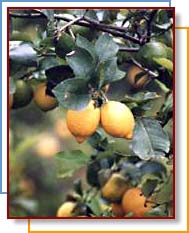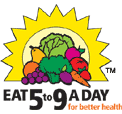Home | FOOD ARTICLES | Food Trivia | Today_in_Food_History | Food_History_Timeline | Recipes | Cooking_Tips | Food_Videos | Food_Quotes | Who’s_Who | Culinary_Schools_&_Tours | Food_Trivia_Quizzes | Food_Poems | Free_Magazines | Food_Festivals_and_Events
Food Articles, News & Features Section
FREE Magazines
and other Publications
Free Professional and Technical Research, White Papers, Case Studies, Magazines, and eBooks
LEMONS
See also: When Life Gives You Lemons; Lemon Trivia;
Lemon Quotes; Limes; Key Limes; etc.
Did You Know
* The lemon originated in China?
* Lemonade was a favorite of the Chinese Emperors?
* Lemons made their way to the United States with the help of Catholic Missionaries and were planted in Arizona and California? Today they produce virtually all of the lemons consumed in the United States as well as about one-third of those used throughout the world
(source The Packer Produce Availability & Merchandising Guide, 1999).
Lemons are valued for their many uses in flavoring the food we eat, as a garnish, and for household purposes.
Selection
Lemons should be firm and have a bright yellow color. Avoid soft, shriveled lemons with spots. The best lemons will be fine textured and heavy for their size. Thin skinned fruit tends to have more juice, while fruit that has a greenish cast is likely to be more acidic. One medium lemon has about 3 tablespoons of juice and 3 tablespoons of grated peel.

Storage
You may store lemons at room temperature for about two weeks. They will keep for up to six weeks in a plastic bag in the refrigerator. Use lemons as quickly as possible after cutting.
Varieties
There are two different types of lemons — acid and sweet. The most common acid varieties include Eurekas and Lisbons. The acidic type is grown commercially and the sweet types are grown mainly by home gardeners. The trees bloom continuously all year and can produce up to 500 or 600 lemons a year.
Quick Tips
- Freeze lemon juice in ice cube trays for later use.
- Add a twist of lemon to the water in ice cube trays for added zip to beverages.
- Use juice on fruit or white vegetables to help them keep their color.
- Remove odors, such as fish, onion, or bleach by rubbing with fresh lemon.
- Lemon and salt can be used to treat rust spots, and to clean copper pots.
- Get the most juice out of your lemon by warming it in the microwave for 15 seconds or rolling it with your hand on the counter if it is at room temperature.
- Add a few drops of lemon juice to whipping cream if it doesn't stiffen.
- Use lemon to replace salt in your recipes….you'll have less sodium.
Make Lemons Part of Your 5 A Day Plan
Use lemons in marinates, especially for chicken and fish. Sprinkle lemon juice on top of your favorite steamed vegetables, seafood, and salads. Mix salad dressing with lemon instead of vinegar. Fresh grated lemon peels add that zest to baked goods, fruit salads, desserts, and sauces. Try replacing other fruits with lemon in your next frozen sorbet. You might drink more water during the day if you add some lemon juice to your water bottle, or a slice to a glass of water.
RELATED ARTICLES
Please feel free to link to any pages of FoodReference.com from your website.
For permission to use any of this content please E-mail: james@foodreference.com
All contents are copyright © 1990 - 2026 James T. Ehler and www.FoodReference.com unless otherwise noted. All rights reserved.
You may copy and use portions of this website for non-commercial, personal use only.
Any other use of these materials without prior written authorization is not very nice and violates the copyright.
Please take the time to request permission.


